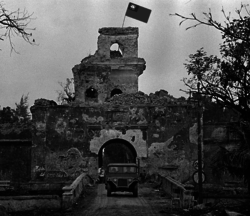Palesmenian Colonization Initiative: Difference between revisions
No edit summary |
No edit summary |
||
| Line 5: | Line 5: | ||
The areas west of the Palesmenia are rough, hilly, and home to many hostile groups. After the many wars and conflicts that the nation endured, turning west for expansion would only mean more trouble. | The areas west of the Palesmenia are rough, hilly, and home to many hostile groups. After the many wars and conflicts that the nation endured, turning west for expansion would only mean more trouble. | ||
===Settlement of Séagúna=== | ===Settlement of Séagúna=== | ||
[[File:Seagunaruins.png|250px|thumb|left|A [[PDF]] truck pulls through the gate of an ancient temple in the city of Saigon, now Séagúna.]] A team of 103 explorers and 200 military personnel left Ábbad early in the morning of July 1st, 175 NDS and began their sail south. After a narrow escape from [[Stormark|Storish]] pirates, the team landed in the ruins of Saigon, the former capital of the [[Jingdao]]ese colony of Xang Nam. Here, a base camp was set up, which included a radio station, a laboratory, and tents for the explorers. As the month continued, settlers continued to explore the island and create more settlements, such as Bánovitáo and Sálkenyuadar. A small military installation, known as CBA-287, was created. The entire island was under the control of | [[File:Seagunaruins.png|250px|thumb|left|A [[PDF]] truck pulls through the gate of an ancient temple in the city of Saigon, now Séagúna.]] A team of 103 explorers and 200 military personnel left Ábbad early in the morning of July 1st, 175 NDS and began their sail south. After a narrow escape from [[Stormark|Storish]] pirates, the team landed in the ruins of Saigon, the former capital of the [[Jingdao]]ese colony of Xang Nam. Here, a base camp was set up, which included a radio station, a laboratory, and tents for the explorers. As the month continued, settlers continued to explore the island and create more settlements, such as Bánovitáo and Sálkenyuadar. A small military installation, known as CBA-287, was created. It had appeared that little to no natives were left behind on the islands, with only some holding out in remote inland rural locations. These natives were then granted Palesmenian citizen as a token of acceptance by the Palesmenian government. The entire island was under the control of the settlers by mid August. | ||
===Settlement of Sánéloda=== | ===Settlement of Sánéloda=== | ||
Just to the north of Séagúna Island lies the Kowloon Peninsula. Due to its close proximity to the settlement of Sálkenyuadar, another group of explorers left Ábbad in mid-August to settle the area. The group landed at the Southern tip of the peninsula and trekked west. When the reached the mouth Cherusken River, they created a camp that would latter become the village of Sánéloda. [[File:Seagunandsanelona.png|250px|thumb|right|The combined settlements of Ségúna and Sánéloda as of late August 2019. | Just to the north of Séagúna Island lies the Kowloon Peninsula. Due to its close proximity to the settlement of Sálkenyuadar, another group of explorers left Ábbad in mid-August to settle the area. The group landed at the Southern tip of the peninsula and trekked west. When the reached the mouth Cherusken River, they created a camp that would latter become the village of Sánéloda. [[File:Seagunandsanelona.png|250px|thumb|right|The combined settlements of Ségúna and Sánéloda as of late August 2019. | ||
[[Category:Palesmenia]] | [[Category:Palesmenia]] | ||
Revision as of 20:52, 28 August 2019
(WIP) The Palesmenian Colonization Initiative is a program created by the Palesmenian government to expand to islands away from the Palesmenian homeland. This resulted in the settlement of the area known as "Chákaritéia", near the ruins of Xang Muang.
Timeline
Background
The areas west of the Palesmenia are rough, hilly, and home to many hostile groups. After the many wars and conflicts that the nation endured, turning west for expansion would only mean more trouble.
Settlement of Séagúna

A team of 103 explorers and 200 military personnel left Ábbad early in the morning of July 1st, 175 NDS and began their sail south. After a narrow escape from Storish pirates, the team landed in the ruins of Saigon, the former capital of the Jingdaoese colony of Xang Nam. Here, a base camp was set up, which included a radio station, a laboratory, and tents for the explorers. As the month continued, settlers continued to explore the island and create more settlements, such as Bánovitáo and Sálkenyuadar. A small military installation, known as CBA-287, was created. It had appeared that little to no natives were left behind on the islands, with only some holding out in remote inland rural locations. These natives were then granted Palesmenian citizen as a token of acceptance by the Palesmenian government. The entire island was under the control of the settlers by mid August.
Settlement of Sánéloda
Just to the north of Séagúna Island lies the Kowloon Peninsula. Due to its close proximity to the settlement of Sálkenyuadar, another group of explorers left Ábbad in mid-August to settle the area. The group landed at the Southern tip of the peninsula and trekked west. When the reached the mouth Cherusken River, they created a camp that would latter become the village of Sánéloda. [[File:Seagunandsanelona.png|250px|thumb|right|The combined settlements of Ségúna and Sánéloda as of late August 2019.